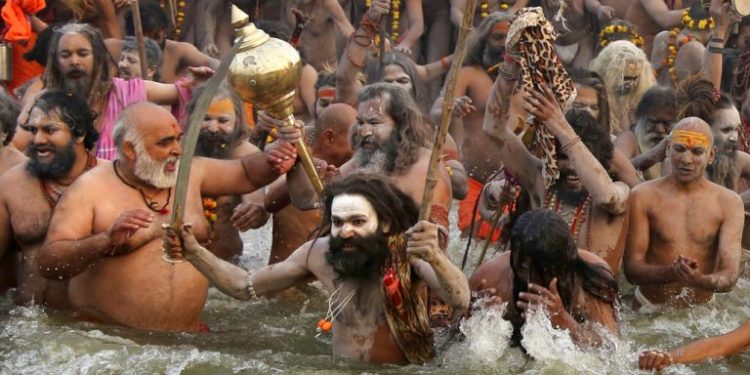Prayagraj: At the world’s biggest religious festival, the Hindu Kumbh Mela in Uttar Pradesh, the spiritual message for the faithful is deep and profound.
The political message for voters isn’t far behind.
As many as 150 million people are expected to come to the festival city of Prayagraj to bathe at the confluence of three rivers considered holy in Hinduism – the Ganges, the Yamuna, and a mythological third one, the Saraswati – with a view to “absolve” them of sins.
The Union and UP governments – both controlled by the Bharatiya Janata Party (BJP) – are spending nearly $600 million on the giant event, according to the state government.
Some Hindu religious and political figures say they expect a return on their efforts, not only from the Gods, but from voters when Modi battles for a second term in an election that must be held by May.
Hindu activists are also using the event to build support for a hugely controversial project to construct a Hindu temple on the site of the 16th century Babri Mosque that was destroyed by a mob in 1992. That assault triggered communal riots and led to the deaths of around 2,000 people, many of them Muslim.
Shrikant Sharma, a BJP leader and Cabinet Minister in the UP government, denied the Kumbh was being used to score political points ahead of the election, and said people wrongly accuse the party of advocating hardline Hindu causes.
“The Kumbh is a matter of faith for us,” Sharma said, hours after bathing there. “That’s why we are working there with complete commitment.”
Uttar Pradesh, India’s most populous state and one of its poorest, is funding two-thirds of the money to provide an “unforgettable pilgrimage experience”. The total cost is more than three times the last Kumbh in 2013.
The BJP nearly swept UP in the last election in 2014, but depressed farm prices, high unemployment and the coming together of two caste-based regional parties have hurt its prospects this year, opinion polls show.
A big loss of seats in the state might prevent Modi and the BJP from returning for a second term in New Delhi.
“Hail Lord Ram”
Politics was never far away at two conferences at the Kumbh last week.
Hindu priests and religious leaders sang praises of Modi and UP Chief Minister Yogi Adityanath for the “best ever” Kumbh.
They also called for people to back the BJP to help it build the temple for Lord Ram at the Babri Mosque site in Ayodhya.
A powerful Hindu priest, who has no association with the BJP, said from his base at the Kumbh he would lead a group of followers February 21 to start building the temple, which could violate a court order and raise religious tensions.
“We must ensure that a nationalist government committed to building a Ram temple stays in power,” Mohan Bhagwat, head of BJP parent and Hindu-first group Rashtriya Swayamsevak Sangh (RSS), said to loud cheers of “Jai Shree Ram!”
At another event there, Bhagwat’s colleague Indresh Kumar told this agency that Modi was the “only meritorious” prime ministerial candidate whose party deserved at least two more terms.
Critics among Indian historians and Muslim leaders say the actions of the BJP and other Hindu activist groups are a not only a threat to harmony, but put the very nature of India as a secular democracy at stake.
They argue Muslims are increasingly being treated as second-class citizens, pointing to the BJP’s plans to give citizenship to non-Muslims from neighbouring Muslim-majority countries such as Bangladesh and Pakistan but not to Muslims.
S Irfan Habib, a New Delhi-based historian, said the Kumbh this year was the BJP’s “Hindu India” plan to prop up the country’s majority religion for political benefit.
India’s population is 80 per cent Hindu and 14.2 per cent Muslim. Under the Constitution following its Independence in 1947, all citizens are supposed to be treated equally.
“This is a blatant violation of the ethos which our Constitution represents and ethos which were cultivated by our freedom fighters,” said Habib, a specialist in modern history.
Governments should stay away from religion, said Habib, who supported the Modi administration’s decision last year to end state aid to Muslims making the annual Islamic Haj pilgrimage.






































